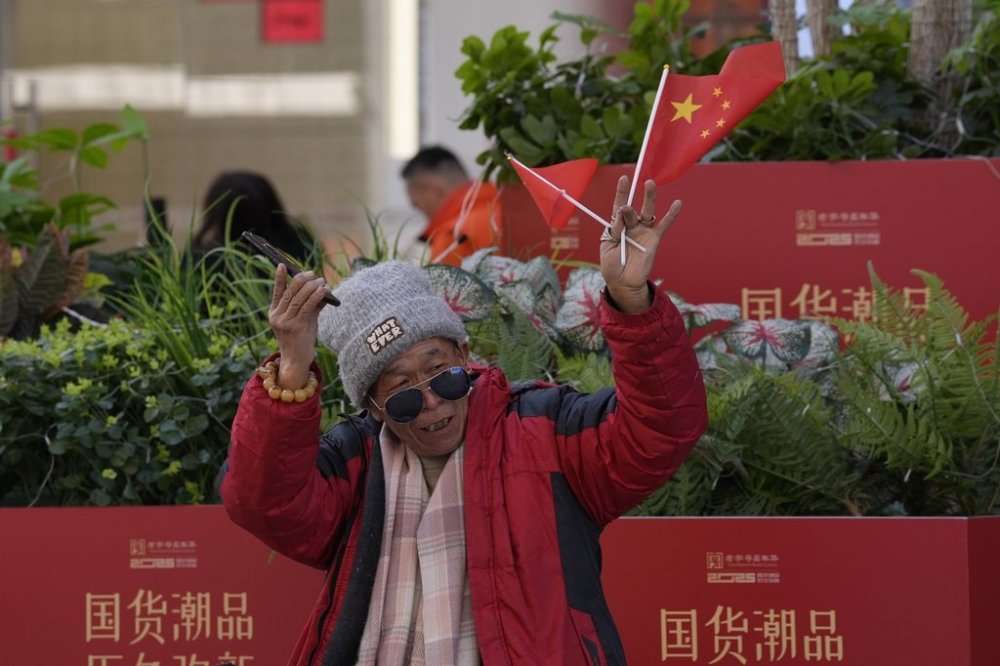China slams US tariffs, says its economy is resilient but there are no winners in a trade war
Advertisement
Read this article for free:
or
Already have an account? Log in here »
To continue reading, please subscribe:
Monthly Digital Subscription
$0 for the first 4 weeks*
- Enjoy unlimited reading on winnipegfreepress.com
- Read the E-Edition, our digital replica newspaper
- Access News Break, our award-winning app
- Play interactive puzzles
*No charge for 4 weeks then price increases to the regular rate of $19.00 plus GST every four weeks. Offer available to new and qualified returning subscribers only. Cancel any time.
Monthly Digital Subscription
$4.75/week*
- Enjoy unlimited reading on winnipegfreepress.com
- Read the E-Edition, our digital replica newspaper
- Access News Break, our award-winning app
- Play interactive puzzles
*Billed as $19 plus GST every four weeks. Cancel any time.
To continue reading, please subscribe:
Add Free Press access to your Brandon Sun subscription for only an additional
$1 for the first 4 weeks*
*Your next subscription payment will increase by $1.00 and you will be charged $16.99 plus GST for four weeks. After four weeks, your payment will increase to $23.99 plus GST every four weeks.
Read unlimited articles for free today:
or
Already have an account? Log in here »
Hey there, time traveller!
This article was published 06/03/2025 (265 days ago), so information in it may no longer be current.
China will not yield to bullying and its economy can weather higher tariffs imposed by U.S. President Donald Trump and other challenges, the Chinese commerce minister said Thursday, though he added that there are “no winners in a trade war.”
Speaking on the sidelines of the annual session of China’s national congress, Wang Wentao reiterated Beijing’s calls for talks. Coercion and threats are bound to fail, he said, noting that China’s role as a main trading partner of 140 nations means it has plenty of options. Wang and other officials outlined Beijing’s strategies for building its economy and financial markets, but did not announce any major new initiatives.
Here are some highlights:

China is open to talks, but will fight US tariffs
The Trump administration has raised tariffs on imports from China twice since taking office in January. China has hit back with duties and other restrictions on American goods and companies. Wang said China expects mutual respect in its dealings with other countries.
“Coercion and threats will not work on China, nor will they scare China. China’s determination to defend its own interests is unswerving,” Wang said, adding that “there are no winners in a trade war.”
“If the American side goes further down this wrong path, we will fight to the end,” he said.
Still, he stressed that China is open to resolving differences over trade. “Our two sides can meet at an appropriate time and our teams can also have communication as early as possible,” he said.
Blaming China for the U.S. fentanyl problem — Trump’s stated reason for imposing 20% tariffs on all imports from China — won’t solve the problem, he said.
China has other options for global trade
China is the main trading partner of 140 countries and regions and has free trade agreements with more than 30 countries, Wang said.
“We are ready to sign more FTA,” he added.
Wang acknowledged that Chinese exporters face serious challenges but said Beijing is encouraging companies to participate in trade shows and to expand globally. The Chinese government is also expanding its financial support for export credit and hopes to increase trade in services and e-commerce.
“We do not put all our eggs in one basket,” he said.
Supporting more consumer demand and business investment
A slump in China’s housing market and lackluster share prices, scant social welfare and job losses since the COVID-19 pandemic have weighed on China’s economy, dragging on growth.
Zheng Shanjie, head of the National Development and Reform Commission, China’s main national planning agency, acknowledged that forecasts for economic growth for 2025 tend to be around 4.6% to 4.8%, below the government’s target of “around 5%.”
Zheng said the government is drafting a “specialized plan of action” to encourage more consumer spending and investment. He did not provide specific details.
China will spend more on “livelihood and consumption,” Finance Minister Lan Fo’an said, promising more help for deeply indebted local governments and bigger investments in education, social security and public health.
“We will make sure that every coin is well spent,” Lan said, adding that “the central government has left ample room for policy to be implemented.”


